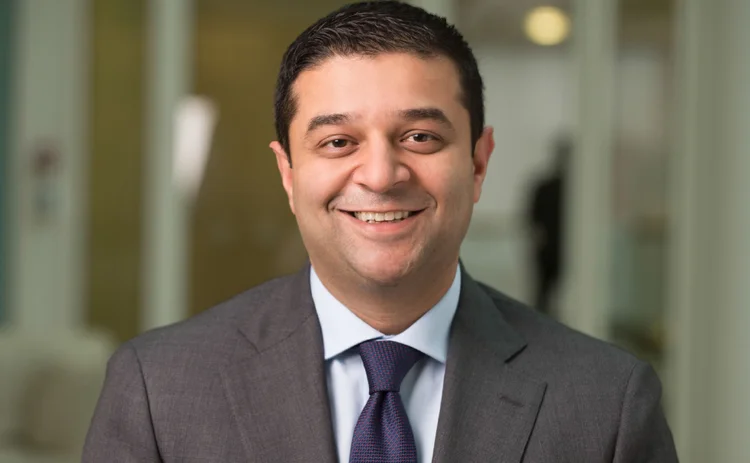
Asset services provider: HSBC
UK institution has facilitated the development of lending markets in the Middle East and Asia

Over the past two years, the volume of HSBC’s lendable assets originating from sovereign investor clients has increased by nearly two-thirds – a growth rate that was made possible by the value that the bank’s asset-servicing team has provided to clients through an unrivalled knowledge of regional markets.
“One thing that Covid-19 brought about was a change in collateral types that central banks and other institutions were using,” says Adnan Hussain, head of agency lending and liquidity services at HSBC. “With a lack of liquidity at the time and portfolio allocations quickly changing, alternative sources of collateral were sought, leading to some Asian markets becoming more mainstream for the purposes of sourcing that collateral.”
While highly rated US dollar assets remain a primary source of collateral for many clients, the growing interest in more esoteric markets has led HSBC to assume a more prominent role within the asset-servicing community. This has benefited central banks, which have been diversifying their portfolio into other high-quality assets, Hussain says.
The strong position HSBC enjoys in many markets has given the UK lender a voice at the table with local regulators, helping to drive through important structural changes in many areas. Markets in the Middle East have been a particular focus.
“We were having conversations with a number of regulators and exchanges during Covid-19, to demonstrate how lending might relieve some of the liquidity challenges being faced during such market conditions. In 2022, many of these projects came to fruition,” Hussain adds.
Local support
One example is the work HSBC has been doing in Saudi Arabia.
Back in March 2021, HSBC successfully completed the country’s first-ever securities lending transaction, but there were some limitations. In particular, the first transaction was restricted to a relatively narrow investment base, chiefly large international institutions that were active on the market.
HSBC tweaked the framework to bring in more local participants and promote education about the new market. It could not have successfully brought about these changes without having a strong local presence on the ground in the country. “The largest investors tend to hold positions for strategic reasons, but for liquidity to really take hold in the market, the investor base needs to be as broad as possible,” says Hussain.
In the US, 70% of the asset managers participating in the securities lending market are active participants, according to Hussain.
“We wanted to achieve similar results out of a new securities lending market in Saudi Arabia,” he adds. “The fact that the retail investor, the pension fund and other large asset owners are effectively benefiting equally in this regard – this is what keeps [the US] market diverse and functioning smoothly.”

HSBC is also working on similar projects in other Middle Eastern countries, including in Kuwait, Qatar and the United Arab Emirates. These are expected to go live in the coming months. Beyond the Middle East, HSBC has worked for some time to support securities lending of local government bonds in 11 Asian countries.
One senior manager within a securities depository that HSBC had worked closely with, commented: “HSBC has been very active in the market. They have offered excellent support and consultation in terms of best practices and what they believe to be the best way to activate the market. I think they have done a good job.”
Another point in HSBC’s favour is the bank’s focus on pledged collateral rather than just title transfer.
“Being able to pledge/fund an asset obviously encourages greater and more efficient use of the asset, and so helps with market development. We have, therefore, supported this structure in each of the markets in which we operate,” Hussain says.
Strategic focus
The benefit that HSBC gets from the work it has been doing with central bank and sovereign investor clients extends far beyond the asset-servicing department.
“The vast majority of the revenue within an agency-type lending function goes to the client; therefore, the benefit of the income is clearly to the investor, [but] central bank clients are also very strategic, as we have a broad network of operations globally,” Hussain says. “The range of our local presence and offerings provides us with greater flexibility to offer a unique, localised service to facilitate securities lending for central banks – that is, it tends to be one piece of a much larger, holistic relationship. This has helped us do more for these clients, whether they are injecting liquidity into the market or for their own returns.”
Hussain says that, over the past couple of years, HSBC has won two key custody mandates – one in the Middle East and one in Asia – because of the long-term strategic partnerships that the bank has cultivated with key central bank clients. The two of them together accounted for in excess of $40 billion of assets.
“The basis for these long-term relationships has been the co-operation on fixed income and FX over many years,” says Bernard Altschuler, head of central bank coverage at HSBC. “But it’s not only that. These central banks also trade gold and have payment accounts with us. We provide thought leadership and pertinent research. This commitment and relationship approach earns us a seat at the table when new business or markets are considered. But, ultimately, we are not going to win that business without competitive pricing.”
The Central Banking Awards 2023 were written by Christopher Jeffery, Daniel Hinge, Dan Hardie, Joasia Popowicz, Ben Margulies, Riley Steward, Jimmy Choi and Blake Evans-Pritchard.
Only users who have a paid subscription or are part of a corporate subscription are able to print or copy content.
To access these options, along with all other subscription benefits, please contact info@centralbanking.com or view our subscription options here: http://subscriptions.centralbanking.com/subscribe
You are currently unable to print this content. Please contact info@centralbanking.com to find out more.
You are currently unable to copy this content. Please contact info@centralbanking.com to find out more.
Copyright Infopro Digital Limited. All rights reserved.
As outlined in our terms and conditions, https://www.infopro-digital.com/terms-and-conditions/subscriptions/ (point 2.4), printing is limited to a single copy.
If you would like to purchase additional rights please email info@centralbanking.com
Copyright Infopro Digital Limited. All rights reserved.
You may share this content using our article tools. As outlined in our terms and conditions, https://www.infopro-digital.com/terms-and-conditions/subscriptions/ (clause 2.4), an Authorised User may only make one copy of the materials for their own personal use. You must also comply with the restrictions in clause 2.5.
If you would like to purchase additional rights please email info@centralbanking.com




